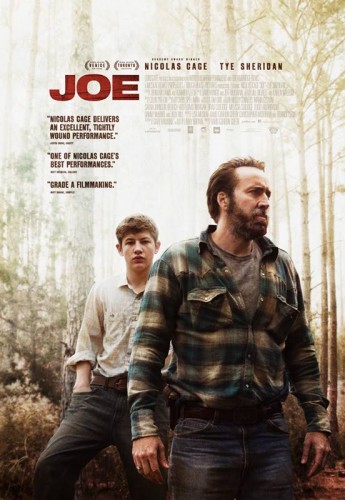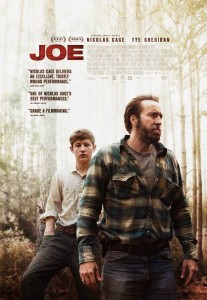The characters in JOE live in an ugly world, one of unconscionable cruelty, rampant alcoholism, and hardscrabble, violent lives. The emotional, psychological and physical brutality that runs through the film — from the story’s opening scene until almost it’s last shot — may demand too much from some moviegoers. But this deeply moving, powerfully acted film also contains pockets of kindness, humor and hope — and a central narrative that offers deliverance for one character and redemption for another.
Nicolas Cage is outstanding as Joe Ransom, an ex-con of fundamental decency who struggles to keep his reckless impulses in check. Joe’s inner rage and penchant for hard drinking and hard-living contrast sharply with the sympathetic manner and easygoing humor he demonstrates at other times — especially as the foreman of an all-black work crew, hired by a local lumber company to poison trees so that the forest can be replanted with more lucrative timber.
Adapted from Larry Brown’s 1991 novel (the screenplay is by Gary Hawkins), Joe is both a character study and an evocation of place. Like the majority of director David Gordon Green’s films, Joe is set in an impoverished, rural South, where dappled sunlight and the beauty of nature cannot disguise the blighted humanity. Green has a gut feeling for this milieu and a genuine sensitivity toward the dirt-poor, uneducated people who populate it. As always, cinematographer Tim Orr is indispensible to the director’s vision.
The story’s emotional core is the father/son relationship that develops between Joe and the teenaged boy who comes to him seeking work. Gary (the gifted young actor Tye Sheridan) endures constant physical and verbal abuse, meted out by his vicious drunk of a father, Wade (an extraordinary acting debut from Gary Poulter, whom Gordon met at a bus stop in Austin, continuing the director’s tradition of casting non-professionals in both minor and key roles). Rather than run away, the teenager stays to protect his mother and younger sister. That sense of responsibility, along with a resilient spirit and solid work ethic, brings out Joe’s protective side and finds him getting involved in a way he normally resists.
Difficult as the picture may be to sit through, Joe is a triumph on many levels, starting with director Green, who finally has fulfilled the promise he demonstrated in 2000 with his haunting, lyrical feature debut, George Washington (although the two films could not be more dissimilar in terms of premise, storyline and tone). As for Cage, who has been squandering his considerable talent for years, Joe marks a welcome return. In addition to the tense physicality and emotional volatility, Cage invests Joe with an almost palpable sense of sadness, as if even when indulging his own worst instincts, he despairs at the lack of humanity around him.
DVD tip: If you haven’t seen George Washington, rent it. Green’s 2004 Southern Gothic thriller Undertow is also worth checking out.

